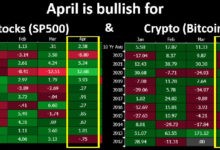Third Straight Week of Weak Crypto Product Inflows

Digital asset investment products experienced a third week of meager inflows, this past week totaling a mere $12 million.
However, it was short investment products almost exclusively that saw the most activity, amounting to $15 million, according to the latest CoinShares report. Meanwhile, long investment products saw outflows of $2.6 million.
According to the report, this represents “new investors expecting further price downside, while those currently invested are not selling out of positions, believing crypto prices are close to a bottom.”
The Americas were responsible for most of the dramatic movements, as the United States had $20.8 million in inflows, while Canada saw $13.3 million in outflows. Within Europe, Switzerland and Sweden were the only countries with significant flows, totaling $5 million and negative $3.1 million respectively.
BTC shorts accounting for most inflows
While short Bitcoin products took up most of the inflows, as has been the case in recent weeks, long Bitcoin products saw outflows totaling $2.6 million. The report noted that total assets under management (AuM) had risen from 11.4% since the end of June to $17.8 billion.
Last week’s flows totaling at $15 million made it the record fourth consecutive week of inflows into short Bitcoin products. This streak of inflows now amounts to $88 million, constituting a whopping 61% of AuM.
Ethereum-based investment products saw their luck run out as minor outflows of $2.5 million ended a three-week run of inflows. However, month-to-date flows remain positive at $6.6 million. Other altcoins saw very little action, apart from Solana, with inflows of $500,000.
Continuing their dominance throughout this turbulent period, multi-assets investment products received inflows of $2 million. This consistent performance has brought year-to-date flows to $219, outpacing any other type of asset.
Overall, the report concluded that investment product volumes are currently very low, trading only $1 billion over the week compared to the year’s weekly average of $2.4 billion. According to the report, “the summer doldrums are here.”






 Bitcoin
Bitcoin  Ethereum
Ethereum  Tether
Tether  USDC
USDC  TRON
TRON  Dogecoin
Dogecoin  Cardano
Cardano  Bitcoin Cash
Bitcoin Cash  Chainlink
Chainlink  LEO Token
LEO Token  Monero
Monero  Zcash
Zcash  Stellar
Stellar  Litecoin
Litecoin  Hedera
Hedera  Dai
Dai  Cronos
Cronos  OKB
OKB  Tether Gold
Tether Gold  Ethereum Classic
Ethereum Classic  KuCoin
KuCoin  Algorand
Algorand  Gate
Gate  Cosmos Hub
Cosmos Hub  VeChain
VeChain  Stacks
Stacks  Tezos
Tezos  Dash
Dash  TrueUSD
TrueUSD  IOTA
IOTA  Basic Attention
Basic Attention  Theta Network
Theta Network  Decred
Decred  NEO
NEO  Synthetix
Synthetix  Qtum
Qtum  0x Protocol
0x Protocol  Ravencoin
Ravencoin  DigiByte
DigiByte  Zilliqa
Zilliqa  Nano
Nano  Siacoin
Siacoin  Numeraire
Numeraire  Waves
Waves  Status
Status  Enjin Coin
Enjin Coin  Ontology
Ontology  Hive
Hive  BUSD
BUSD  Lisk
Lisk  Pax Dollar
Pax Dollar  Steem
Steem  Huobi
Huobi  NEM
NEM  OMG Network
OMG Network  Bitcoin Gold
Bitcoin Gold  Augur
Augur